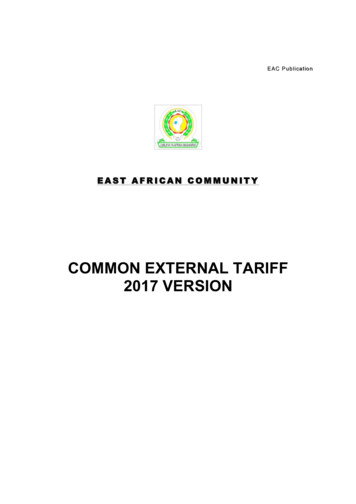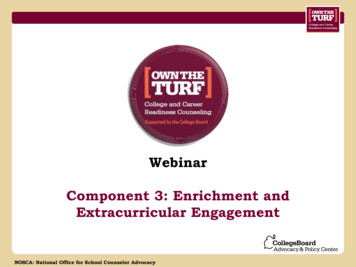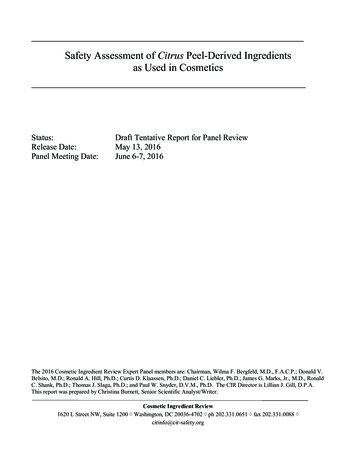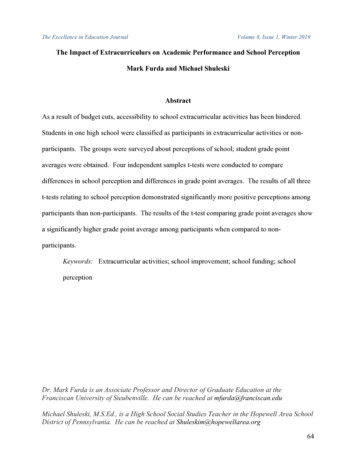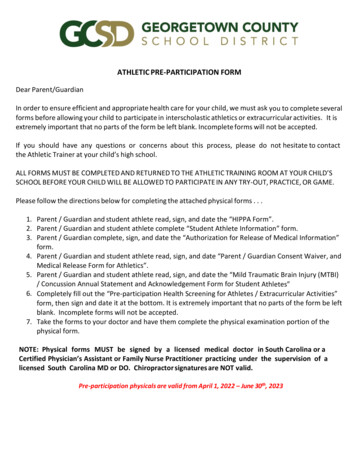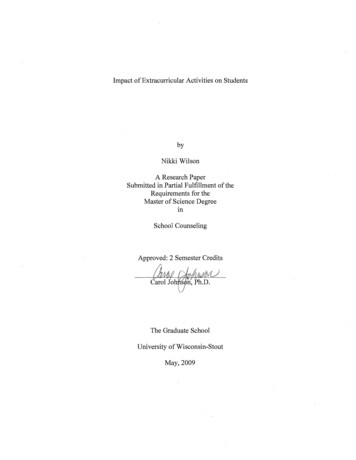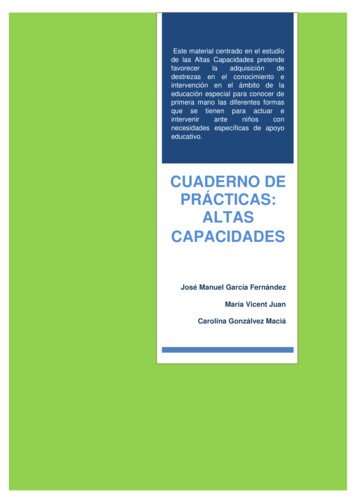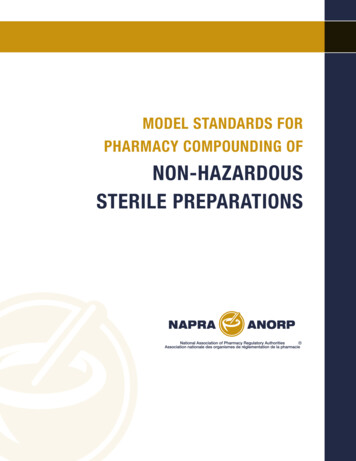
Transcription
EXTRACURRICULAR/ CO-CURRICULAR PREPARATIONS AND THERELATIONSHIP TO LEADERSHIP STYLES OF K-12 ADMINISTRATORSA DissertationPresented tothe Faculty of the Graduate SchoolUniversity of Missouri – ColumbiaIn Partial Fulfillment of the Requirements for the DegreeDoctor of EducationByAPRIL JEAN HAWKINSDr. Robert Watson, Dissertation SupervisorDecember 2010
The undersigned, appointed by the dean of the Graduate School, have examined thedissertation entitledEXTRACURRICULAR/ CO-CURRICULAR PREPARATIONS AND THERELATIONSHIP TO LEADERSHIP STYLES OF K-12 ADMINISTRATORSPresented by April Hawkins,A candidate for the degree of Doctor of EducationAnd hereby certify that, in their opinion, it is worthy of acceptance.Dr. Robert WatsonDr. Cynthia MacGregorDr. Kim FinchDr. Gerald MosemanDr. Beth Hurst
DEDICATIONThis dissertation is dedicated to my family,Especially my husband, who has made continued personal and professional sacrifices sothat I could continue on with my education and pursue my professional dreams. I amforever grateful for his hard work, love, sacrifices, and support;To our amazing Nanna, who has been there for our children in my absence, she has beenmuch more than a caregiver to our family. Without her, it would not have been possiblefor me to achieve this undertaking;and finally to our three children, whose encouragement and understanding helped mecomplete this endeavor.
ACKNOWLEDGEMENTSIn order to achieve any great victory, I recognize that it takes concerted efforts ofmany individuals working together as a team. As I have embarked upon this journey,there have been many individuals that have been a part of my team acting as my coaches,teammates, or cheerleaders, assisting me along the way. Each deserve worthyrecognition. First and foremost, I would like to thank God, for giving me the strength,knowledge, and opportunity to complete this doctoral program. To my professors(academic coaches), I am honored to have worked with Dr. Robert Watson and Dr.Cynthia MacGregor. They have provided me with the continued guidance, structure,support, and celebration. I also appreciated their willingness to go above and beyond inorder to facilitate dissertation boot camps to keep me progressing forward. I am gratefuland appreciative of the many hours they invested in me and my learning. I couldn’t havedone this without them! I would also like to thank the rest of my dissertation committeemembers, Dr. Beth Hurst, Dr. Kim Finch, and Dr. Gerald Moseman for their professionalguidance, support, and willingness to serve. I would also like to acknowledge JudithHaefeker, a former colleague of mine, and the best person I know that can clean up theEnglish language (my grammar coach). I am thankful for her assistance in proofreadingand editing my dissertation.Next, I salute my dear friend Doretta Fox, who has been my dissertation workpartner as we have held each other accountable in order to “get-r-done!” I also appreciatemy peers (teammates) in Cohort V and especially, Melonie Bunn, and Brad Owings as wehave had shared many fun times as we worked throughout this doctoral program together.ii
Professionally, I am blessed and honored to serve with an outstandingadministrative team of Nixa Public Schools. I appreciate my colleagues for theirleadership, support, and their willingness to collaborate with me as we work together tomeet the many needs of all of our students. Grateful for the awesome Inman Rowdiesand my office sidekick, Sue Clement, they have truly have been my cheerleaders alongthe way! I appreciate each of them dearly and I am proud to serve as their principal!I’d like to acknowledge two of my greatest professional influences, Mr. JerryParrett for seeing my potential, being one of my greatest fans, and being an awesomefather-like mentor, a strong Christian role model and again, an encourager, and mostimportantly, a friend in education who has coached me throughout my stint as a principal.Another key individual who has assisted me in my educational journey is formerundergraduate advisor, coach, professor, and mother-like mentor, Dr. Marilyn Graves, forher strong Christian values, leadership, and educational guidance she has provided in myearly stages as I entered the educational arena. Furthermore, though there are too manyothers to name, I’d like to acknowledge all of my former teachers and coaches. Becauseof their great role-modeling, leadership, and influence; they have helped mold me intobeing the woman I am today.Finally, I am honored to acknowledge my family for the many sacrifices they haveall made so that I could complete this degree. I could not have done this without each oftheir contributions and support. I thank my father and step-mother, Craig and SharrySmith, for instilling in me the importance of valuing education and lifelong learning, andmy dad for his encouragement for me to stay actively engaged in extracurricular and cocurricular activities. I am confident these experiences have had a significant influence onmy learning, leadership, and life lessons. I appreciate Anna and Dave Hawkins, myiii
mother and father in-law, for their support and helping take care of the Hawkinsgrandchildren both summers while I was away in Columbia taking courses and obtainingresidency. Dave Hawkins Sr. (Pop), I am grateful for his financial support and love alongthe way. Bonne and David Faletti, for being our family care takers and simply, takingcare of all of us! I have been so blessed to have Bonnie and David become part of ourfamily, the countless hours of exhaustion Bonnie experienced because of my many latenights at school, going to night class, having dissertation work nights, and for all the extrahelp she has given our family around the house because of my heavy work load-I amforever grateful! To my husband Jeffrey, our family pillar of strength. Words cannotexpress my thankfulness for his way of picking up my slack for the past five years. I amthankful for how he was able to keep up with laundry, dishes, and take care of our youngchildren by himself on so many occasions. I know on many occasions he felt like a singlefather raising our children. He has sacrificed many opportunities of going fishing to takecare of things I couldn’t. I am grateful for him, his love, and the “rock” he has providedfor our family. I promise I will make it up to him by helping him find his way to the lakefor many fishing trips to come. To my children, Alli, Jake, and Kami, I know they areglad their mommy is finally done! Yes, now we can all go to my graduation! I love themall dearly! The truth is that teamwork is at the heart of great achievement. JohnMaxwelliv
TABLE OF CONTENTSACKNOWLEDGEMENTS . ii1. INTRODUCTION TO THE STUDY . 1Background of the Study . 1Theoretical Underpinnings of the Study . 5Statement of the Problem . 8Purpose of the Study . 9Research Questions . 10Limitations, Assumptions, and Design Controls. 12Definition of Key Terms . 13Summary . 152. REVIEW OF RELATED LITERATURE . 16Introduction . 16Extracurricular Activities and the Brain . 16Youth Athletic Opportunities . 21Higher Education Student Leadership Programs . 28Leadership and Extracurricular Background . 30Transformational Leadership . 42v
Transactional Leadership . 56Laissez-Faire Leadership . 593. RESEARCH DESIGN AND METHODOLGY . 61Introduction . 61Researcher Biases . 62Research Questions . 63Design of the Study . 65Population and Sample . 67Data Collection Procedures and Instrumentation . 67Data Analysis Procedures . 71Summary . 724. RESULTS. 74Introduction . 74Demographic and Descriptive Information . 76Research Questions Findings . 77Summary . 1065. SUMMARY AND CONCLUSIONS .110Introduction .110Summary of Findings . 111vi
REFERENCES . 124APPENDIX . 130A. Cover Letter . 130B. Informed Consent Form . 131C. Profile of Extracurricular Preparations (PrEP). 132D. Post Hoc Tests with Multiple Comparisons for Transformational: IC. . 136VITA . 137vii
LIST OF TABLESTable 1 Leaders’ Level at Which They Administrate. 77Table 2 Descriptive Leadership Style Response for High EC-High CC Leaders . 81Table 3 Descriptive Leadership Style Response for High EC-Low CC Leaders. 84Table 4 Descriptive Leadership Style Response for Low EC-High CC Leaders. 86Table 5 Descriptive Leadership Style Response for Low EC-Low CC Leaders . 88Table 6 Open-ended Responses of Other Leadership Preparation Opportunities. 91Table 7 Leadership Skills Obtained from EC and CC Engagement .94Table 8 Pearson Correlation for EC Score . 99Table 9 Pearson Correlation for CC Score . 102Table 10 One-way ANOVA for Leadership Subscales . 104viii
ABSTRACTDue to the high stakes accountability, the many demands placed on educationalleaders, and the numerous challenges to meet high expectations for all students, the needfor high quality school leaders is more essential today than ever before. Coaching andtraining staff, building relationships, leading change, providing adequate resources,building school climate, analyzing and using data to drive decision making, engaging inreflective practices, are among several of the important leadership behaviors andpractices necessary to lead effectively. Many of these skills can be transferable fromleaders’ previous experience in extracurricular and co-curricular activities. According toMarzano et al. (2005), limited research has been done on specific behaviors of effectiveleaders. Bass and Riggio (2006) recognized the need to better understand the roots ofleadership development. Maxwell (1993) stated that leadership is learned and developsover time spent in purposeful engagement. The purpose of this dissertation was to studythe relationship between extracurricular and co-curricular preparations and therelationship to school leadership.Using the Multifactor Leadership Questionnaire (MLQ) Form 5X (Avolio & Bass,2004) and the Profile of Extracurricular Preparations (PrEP), which was designed by theresearcher, to obtain other demographic and descriptive information of select leaders, theresearcher examined participation levels of extracurricular and co-curricular preparationsof leaders prior to them assuming their leadership roles within the school. The researcheraimed to examine specific leadership styles based on extracurricular and co-curricularpreparations and to study possible relationships that could be evidenced or significantwith current educational leaders.ix
The results of the study found within each of the four leader groups (High ECHigh CC, High EC-Low CC, Low EC-High CC, and Low EC –Low CC), leadersreported themselves as having similar leadership styles. Additionally, Outcomes:Effectiveness, and Outcome Satisfaction and other Transformational styles of IndividualConsideration and Idealized Behavior were also among the top reported used leadershipstyles.The researcher correlated leaders’ extracurricular score with MLQ leadershipstyles using Pearson correlations. Of the leaders who rated themselves high inextracurricular, the analysis revealed there was only one significant score. Outcomes:Extra Effort had a weak negative Pearson Correlation. Co-curricular engagement levelsrelated to MLQ leadership revealed a few more significant findings and several close tosignificant findings. The first significant correlation revealed a weak positive andsignificant Pearson Correlation to the Transformational: Idealized Attributes subscale.Another significant, weak negative Pearson Correlation was evidenced between cocurricular scores and Transactional Management by Exception –Active (MBE-A).The researcher also performed an analysis comparing the four groups of leadersbased upon their level of extracurricular and co-curricular engagement in using a oneway ANOVA. Between groups, the Transformational: Individual Consideration grouprevealed a significant difference. Unlike the findings with the extracurricular scores, thedata revealed half of the MLQ factors had either significant or nearly significant relationswith the co-curricular scores.Post Hoc Tests were utilized to examine multiple comparisons to analyzesignificant relationships on the one-way ANOVA. Transformational: IndividualConsideration leadership style unveiled a significant difference between the High EC –x
High CC and the High EC –Low CC leader groups. Another significant difference wasevidenced between the High EC –Low CC leader group and the Low EC –High CCgroup. The qualitative findings revealed that the majority of the participants felt theirprior engagement in extracurricular and co-curricular activities helped their developmentof leadership skills. Several insights were provided to the researcher regarding the manyleadership skills participants obtained through their experiences as a participant inextracurricular or co-curricular activities or in the role of a coach or director.Discussions for future recommendations included revisions to the PrEP orutilizing other leadership measurement instruments to better understand the teamingcomponents of leadership associated with extracurricular activities and to analyzeleadership with a more comprehensive approach. Additionally, analyzing leadershipopportunities within the participant layer of engagement could also provide greaterinsights into leadership development.xi
CHAPTER ONEINTRODUCTION TO THE STUDYBackground of the StudySchools are facing numerous challenges with the increase of high-stakesaccountability for student learning to be correlated with national standards, an increase infederal and state mandates, a continued decline of resources, while facing more diversestudent populations with increasingly more individualized special needs than ever before.The need for high quality school leaders is essential to meet these challenges. Accordingto Reimers (2009):Good educators know that the real world is ever more interconnected andinterdependent. We all share in facing such planetary challenges as climatechange, health epidemics, global poverty, global economic recessions and tradeimbalances, assaults on human rights, terrorism, political instability, andinternational conflicts. We also share opportunities for global collaboration insuch areas as scientific and artistic creation, trade, and international cooperation.These challenges and opportunities define the contours of our lives, even in theirmost local dimensions. Yet in spite of growing awareness of the importance ofdeveloping global skills, few students around the world have the opportunitytoday to become globally competent. (p. 60)Reimers (2009) declared educational leaders of the 21st century are charged with theresponsibility of preparing students for a complex and interconnected global society.One phenomenon noted by the researcher in the role of a public schooladministrator is traditionally many school leaders or top administrators of businesses andorganizations had previously been involved in extracurricular or co-curricular activities1
as part of their previous leadership experiential training. The researcher wanted to explorewhat possible correlations could be made regarding previous involvement inextracurricular and co-curricular activities and current leadership styles and to furtherexamine the phenomenon. Additionally, regardless of leaders’ preparations prior toassuming administrative roles, practitioners recognize the importance of on-goingprofessional development necessary to bring about high levels of student achievement.Marzano, Walters, and McNulty (2005) emphasized the importance of on-goingleadership training for principals and the correlation to high levels of studentachievement.Despite the importance of on-going professional development, officials are facedwith the dwindling of professional development funds in response to financial constraintsand continual budget cuts due to funding from the federal, state, and local levels. Theresearcher recognizes the importance of determining how these preparations may enhanceleaders’ styles and approaches while determining if the research could help guide districtsto save money in professional development or in the selection process of hiring newadministrators.Furthermore, as many leaders are continually reaching the retirement age andleaving the profession, it would be valuable for school districts to know what type oftraining, skills, or experiences are valuable to leaders and what skills are easilytransferable into leadership. These background preparations could yield correlations forleadership styles as employers look for potential administrative candidates while beingfiscally responsible with district funds and specifically, funds associated withprofessional growth offerings and other expenses related with leadership training anddevelopment.2
Marzano et al. (2005) upheld “the leadership training the principal attends is sopowerful that it places the principal at the top percentile in leadership behavior whichover time would predict the average student achievement levels” (p. 10). Marzano et al.(2005) then streamlined their findings identifying 21 responsibilities of a school leader,which corresponded with Cotton’s (2003) findings that identified 25 essential leadershippractices. In concurrence with both Cotton’s (2003) and Marzano et al.’s (2005) findings,the researcher sought to determine how varying levels of involvement in extracurricularpreparations can yield essential responsibilities, practices, or specific skills thus allowingindividuals to have possibly already experienced many of these practices through priorpreparatory opportunities.The researcher sought to investigate if involvement in extracurricular and cocurricular preparations helps to develop skills, leadership profiles, and practices to helpnurture the leadership styles of individuals and what type of relationships may exist.Many leadership experts believe leadership can be developed through purposefulengagement in training and learning opportunities. Maxwell (1998) argued developingleadership takes time and is developed daily with purposeful intentions to practice andapply to one’s life daily. “If you continually invest in your leadership development,letting your ‘assets’ compound, the inevitable result is growth over time” (Maxwell,2002b, p. 12).“The ability to lead is really a collection of skills, nearly all of which can belearned and improved” (Maxwell, 2002b, p. 13). Through involvement in extracurricularand co-curricular activities, opportunities continually teach individuals leadershipqualities such as self-discipline and perseverance, which are critical qualities for effectiveleaders to uphold. Additionally, Maxwell (2002b) later emphasized, “Successful leaders3
are learners, and the learning process is ongoing, a result of self-discipline andperseverance” (p. 14).Further proclaimed by Maxwell (2002b):Leadership ability is always the lid on personal and organizational effectiveness.If the leader is strong, the lid is high. But if it’s not, then the organization islimited. That’s why in times of trouble, organizations naturally look for newleadership. When a country is experiencing hard times, it elects a new president.When a church is floundering, it searchers for a new senior pastor. (p. 9)Just as in athletics, “When a sports team is continually losing, it looks for a newhead coach. When a company is losing money, it hires a new CEO” (Maxwell, 2002b, p.9). Maxwell (2002b) also discussed that by individuals increasing their leadership ability,they can raise their level of effectiveness in leading organizations, teams, churches, oreven the government.As the researcher examined the relationship between extracurricular preparationsand effective leadership, many pertinent leadership theories that are firmly establishedand widely accepted can be applied to situations within extracurricular preparations.Important components of transformational leadership and charismatic leadership,transactional leadership, situational leadership, intuitive leadership, and othercomponents of leadership such as use of teaming strategies are all linked toextracurricular preparatory programs. As schools continue to seek high-qualityadministrators in the years to come, it is important to understand how previousextracurricular and co-curricular preparations can help to prepare or foster leadershipbehaviors for school administrators.4
Theoretical Underpinnings of the StudyMaxwell (2005) asserted that leadership can be learned through motivation,purposeful training and that only a few leadership skills are instinctive in nature. Hereferred to one type of leader he called the learned leader, which is someone who hasseen leadership modeled most of one’s life, has learned leadership through training, andhas had self-discipline to be a great leader, indicating all three qualities were acquired.In light of theory of leadership development, Jensen (2006) clearly indicatedthrough his research of the human brain relating to human growth and development, thatthe human brain is highly experience-dependent, meaning the life one leads influencesone’s brain development. The brain develops and changes based on the quality ofinteractions, hence adjusting the brain as individuals grow and develop.Many studies and research indicated many commonalities between youthdevelopment programs and connections to life-long learning and development forpotential leadership skills. Leadership styles of school administrators will be examinedutilizing the framework of Bass and Avolio (2002) Full Range Leadership Theory, whichdistinguishes three styles of leadership- transformational, transactional, and laissez-faire.These primary styles of leadership will be briefly addressed to provide an underpinningfor the research; however, they will later be described in further detail in the review ofliterature.Researchers of transformational leadership have begun to recognize theimportance of youth developmental programs and their relationship to one’s ability todevelop as a leader. Bass and Riggio (2006) noted:Clearly we also need to better understand the roots of transformational leadershipdevelopment, to help in early training interventions. In the past decade, the5
number of youth leadership development programs have exploded. As has beenmentioned, the roots of leadership begin early, so it can be argued that involvingyouth in leadership development-even as early as 8 years of age could be animportant step toward developing further transformational leaders. (p. 234)Bass and Riggio (2006) also recognized that significant work has been done withtransformational leadership training; however, much more is needed. “Astransformational leadership development programs continue to expand, we hope thatevaluation research, particularly longitudinal investigations of leadership development,will also increase to help inform continuous program development” (Bass & Avolio,2006, p. 234). Bass and Avolio (1990) proposed that certain types of leadership styles canbe developed. A synopsis of these leadership styles will be provided here to give thereader context to the underpinnings of the study.Transformational leadership is one of the primary styles both Bass and Avolio(1990) projected as having significant positive impacts on leadership. Underpinned by thework of Bass (1985), he alone asserted, “Transformational leadership arousestranscendental interests in followers and/or elevates their need and aspiration levels. Indoing so, transformational leadership may result ultimately in a higher level ofsatisfaction and effectiveness among the led” (p. 32). Bass (1985) further contended, “Weneed to improve our understanding of the short- and long-term motivation, commitment,involvement, satisfaction, creativity, and productivity of industrial, governmental,military, and educational personnel as a function of the extent to which their superiors aretransactional or transformational” (p. 32).Bass (1985) emphasized with the importance of transformational leadership “Wewill need to learn how to develop in managers the sensitivity and interpersonal6
competence required for them to function as transformational leaders” (p. 32). In additionto transformational leadership, transactional leadership is another style commonly used.Burns (1978) suggested:Transactional leaders approach followers with an eye to exchange one thing fromanother: jobs for votes, or subsidies for campaign contributions. Exchanges thatare transactional in nature comprise the majority of the relationships amongleaders and followers, especially in groups, legislatures, and parties. (p. 34)Finally, a third type of leadership which served as underpinnings to Bass andAvolio, (1990) studies on leadership styles include the non-leadership approach, whatthey referred to as Laissez-Faire. This approach demonstrated a lack of guidance,leadership, and support. Yukl (2006) described laissez-faire as a leader who demonstrateslack of concern about the responsibilities. Beyond the leadership styles mentioned byBurns (1978), Bass (1985), and then Bass and Avolio (1990, 2004), additional readingsfurther provide more of a context to the various practices and applications of leadershipstyles, hence providing a more comprehensive understanding to leadership approaches.Hersey, Blanchard, and Johnson (2001) described their theory of leadership asleaders taking a prescriptive approach by examine situations as a whole and then responddiagnostically according to follower needs. By applying situational leadership styles,successful leaders need to know when, what, how, why, and to whom to apply particularleadership theories into practice. In support of Situational Leadership and understandingthe context of leadership, Dyer and Carothers (2
leadership development. Maxwell (1993) stated that leadership is learned and develops over time spent in purposeful engagement. The purpose of this dissertation was to study the relationship between extracurricular and co-curricular preparations and the relationship to school leadership.
